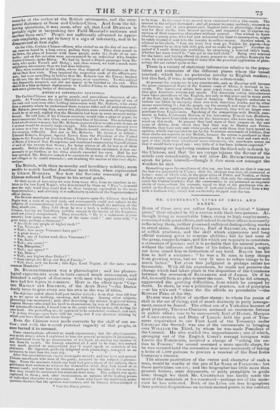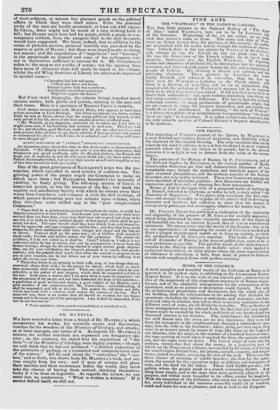MR. COURTENAY'S LIVES OF CECIL AND HANBY.
BOTH of these men are rather figures for a political " history piece," than adapted to fill a canvas with their own persons. Al- though living in remarkable times, rising to high employments, concerned w it h great affairs, and indeed from their offices necessarily influencing them, neither possessed sufficieadistinguishing marks to stand alone. ROBERT CECIL, Earl of SALISBURY, was a man of selfish prudence, and the skill which experience and long official training gives to average abilities ; but he had none of the grasp, comprehension, and fire which are requisite to constitute a statesman of genius; and it is probable that his natural powers, without the influence and fame of his father, BURLEIGH, might not have raised him to distinction of any kind. BACON has hit him in half a sentence: " he was a fit man to keep things from growing worse, but no very fit man to reduce things to be much better." Yet even this judgment is perhaps rather too favourable. With all his experience, he could not perceive the change which had taken place in the disposition of the Commons between the accession of ELIZABETH and of JAWS. Or if he did, he could form no plan to meet the case: What he did attempt, aggravated the growing difficulties, from which he escaped by death. In short, he was a politician of practice, not of principles —at his wit's end " when the file affords no precedents"—the ROBERT PEEL Of MS day. DANBY was a fellow of another stamp; to whom the praise of skill in the art of rising, and of much dexterity in party manage- ment, cannot be denied. The eldest son of a Yorkshire baronet of good property, Tilos' AS OSBORNE amassed an enormous fortune in public office ; rose to be successively Earl of DANBY, Marquis of CARNIARTHEN, and Duke of LEEDS; held the post of Trea- surer (equivalent to our First Lord of the Treasury) under CHARLES the Second: was one of the instruments in bringing over WILLIAM the Third, by whom he was made President of the Council. He also evaded two impeachments ; one of which, springing out of the English Court's corrupt intrigues with Louts the Fourteenth, involved a charge of " selling the na- tion to France;" the second assumed a more specific shape, for he was accused (and the accusation was never answered) of taking a bribe of 5,500 guineas to procure a renewal of the East India Company's charter. The minute particulars of the career and character of such a man, would be worthy of the pen of LE SAGE or FIELDING: but these particulars are hot; and the biographer has little more than general history, state documents, or party pamphlets to guide him: though we think Mr. CoutereNast has hardly made the most of the materials at his command—perhaps not of the mate- rials he has collected. Both of the Lives are less biographies than political disquisitions on certain mooted points in the conduet of their subjects, or minute but pleasant gossip on the political affairs in which they were chief actors. Even the personal traits of the men are hardly presented; at least not with vigour. In CECIL, there might not be much of a very striking kind to tell ; but DANBY must have had his points, which a grope in con- temporary rubbish, from the pungent libel to the dull despatch, would have suggested. We learn, indeed, that in addition to the crime of plebeian success, personal hostility was provoked by the reserve or pride of' DANBY; but these were impediments to rising, not means ; and the imputations of" impudence" and " knavery " in the pasquinade on himself and some of his colleagues, were not in themselves sufficient to account for it. Mr. COURTF.NAY refers to the song as not worthy of notice; but the opening lines have more of character than will easily be found in his volume. whilst the old Whig doctrines of Liberty are afterwards expressed in spirited verse- " Clarendon had law and sense,
Clifford was fierce and brave, Bennett's grave look was a pretence, And Danby's matchless impudence Help'd to support the knave."
But if not strict biography, the volume brings together much curious matter, both public and private, relating to the men and their times. Here is a specimen of ROBERT CECIL'S veracity. Cecil always corresponded with Michael Hicks, who appears to have been private secretary to Lord Burleigh. The following extract of a letter, written while he was at Dover, shows that the young politician had learned, at this early period of his life, sore of the least amiable practices of official men. "Mr. Woudell, at my departure, entreated me to solicit my Lord that he might come over, if his Lordship had occasion to send over. This I am loth to do; and therefore, good Michael, make this lie for me—that you have area some private letter of name to my Lord, wherein I have pea:formed his request to recommend his desire ; which done, he is satisfied, and the thing will never be more thought of."
QUEEN ELIZABETH ON " LIBERAL" DIPLOMATIC EXPENDITURE.
An injunction given about this time to this Ambassador, is characteristic of Elizabeth. " Her Majesty wishea me to note to you this one observation, that whatsoever you spend needlessly, after the Enylish fashion, the French will laugh you to scorn for it, and she will never thank you ; for there never came French Ambassador hither, but staved their master as well with frugality as any of hers have served her with prodigality."
One of the great grievances of ELIZABETH'S reign was the mo- nopolies, which extended to most articles of common use. The growing power of the people urged the Commons to make an attack upon them.; hut ELIZABETH forestalled the necessity of yielding, by freely giving. The following oration of Cum is somewhat quaint, as was the manner of the day ; but mark the rapidity and satisfactory brevity with which he sweeps away their worse than Corn-laws, and compare it with the dull verbiage, of which present Secretaries pour out column upon column, when they introduce some addled egg to the "poor simple-witted Commons."
" There shall be a proclamation general throughout the realm, to notify her Majesty's resolution in this behalf. And because you may eat your meat more savoury than you have done, every man shall have salt as good and cheap as he elan buy it or make it, freely without danger of that patent, which shall be pre- sently revoked. The same benefit shall they have which have cold stomachs, both for aqua-vitie and aqua composite, and the like ; and they that have weak stomachs, for their satisfaction shall have vinegar and alegar and the like set at liberty. Train-oil shall go the same way ; oil of blubber shall march in equal rank ; brushes and bottles endure the like judgment. The patent for pouldavy, if it be not called in, it shall be. Oaad,• which as I take it is not restrained either by law or statue:, but only by proclamation (1 mean from the
i
former sowing), though for the saving thereof t might receive great disputa- tion, yet, for your satisfaction, the Queen's pleasure is to revoke that procla- mation; only she prayeth thus much, that when she corneth in progress to see you in your counties, she be not driven out of your towns by suffering it to infect the air too near them.
" Those that desire to g0 eprucely in their ruffs, may, at less charge than ac- castomed, obtain their wish ; for the patent for starch, which bath so much been prosecuted, shall now be repealed. There are other patents which be con- siderable, as the patent of new drapery, which shall be suspended and left to the law. Irish yarn, a matter that I am sorry there is cause of complaint ; for the savageness of the people and war have frnetrated the hope of the patentee- * gentleman of good service and deceit, a good subject to her Majesty, and a good member of the commonwealth, Mr. Carmarthen : notwithstanding, it shall be suspended, and left to the law. The patent for calf-skins and fells, which was made with a relation, shall endure the censure of the law. But I must tell you, there is no reason that all should be revoked, for the Queen mean. not to be swept out of her prerogative. 1 say it shall be suspended, if the law do not warrant
• Woad, we believe, whose growth was prohibited, or interfered with.























 Previous page
Previous page